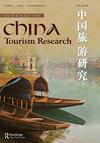游客与居民的互动影响相互理解,但受社会距离的影响
IF 1.3
Q3 HOSPITALITY, LEISURE, SPORT & TOURISM
引用次数: 0
摘要
摘要:本研究考察了中国内地游客与香港城市旅游目的地居民之间的社会距离、游客-居民互动和相互理解的相互关系。社会距离影响游客与居民互动,预测游客与居民的相互理解。共获得旅游问卷416份,居民问卷315份。结果表明,互动质量是预测相互理解的主要因素,但社会距离对游客和居民的相互理解都有负面影响。从游客的角度来看,只有互动质量能预测理解,但受到社会距离的负向影响。从居民的角度来看,互动质量和集中互动都对理解产生积极影响,但受其社会距离的影响。共同存在不影响居民的理解,但与他们的社会距离正相关。总体而言,游客与居民的互动可能有助于相互理解,但只有在社会距离较小时开始。研究结果对旅游目的地的可持续发展具有重要意义。本文章由计算机程序翻译,如有差异,请以英文原文为准。
Tourist-resident interaction affects mutual understanding but defined by social distance
ABSTRACT This paper examines the interrelationships of social distance, tourist-resident interaction and mutual understanding between mainland Chinese tourists and residents in an urban destination of Hong Kong. Social distance affects tourist-resident interaction that predicts their mutual understanding for both tourists and residents are tested. A total of 416 tourist questionnaires and 315 resident questionnaires were obtained. The results show that quality of interaction is a major factor in predicting mutual understanding but negatively affected by social distance for both tourists and residents. From tourist perspective, only quality of interaction predicts the understanding but negatively affected by their social distances. From resident perspective, both quality of interaction and focused interaction positively affect the understanding but defined by their social distances. Co-presence does not affect residents’ understanding but is positively related to their social distance. Overall, tourist-resident interaction may contribute to mutual understanding, but only when the social distance is small to start with. The research findings have significant implications for sustainable development of tourism destinations.
求助全文
通过发布文献求助,成功后即可免费获取论文全文。
去求助
来源期刊

Journal of China Tourism Research
HOSPITALITY, LEISURE, SPORT & TOURISM-
CiteScore
4.00
自引率
10.50%
发文量
40
期刊介绍:
Journal of China Tourism Research (JCTR) is the official journal of the International Association of China Tourism Studies (IACTS) and is now indexed in the Emerging Sources Citation Index (ESCI)! JCTR is a truly international journal that publishes the latest research on tourism (all articles printed in English with Chinese abstracts) that relates to China and the Chinese. It provides a rich forum for exchange of fresh information and ideas among academics and practitioners; fosters and enhances cutting-edge research activities that advance the knowledge of tourism; and discusses the relevance of tourism to Chinese society. The journal encourages interdisciplinary scholarship and commentaries, aims at the highest intellectual level, and only publishes manuscripts that make significant contributions to the subject areas.
 求助内容:
求助内容: 应助结果提醒方式:
应助结果提醒方式:


